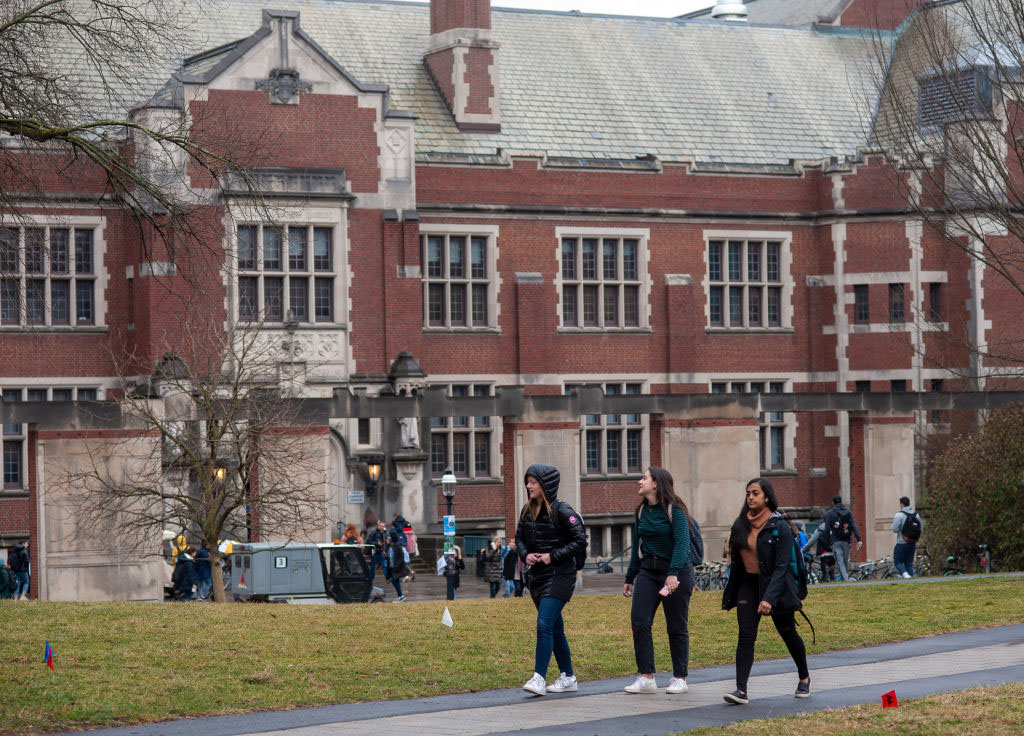 Students walk on campus at Princeton University on February 4, 2020 in Princeton, New Jersey. (Photo by William Thomas Cain/Getty Images)
Students walk on campus at Princeton University on February 4, 2020 in Princeton, New Jersey. (Photo by William Thomas Cain/Getty Images) On Wednesday, April 20, Princeton’s Undergraduate Student Government (USG) released its official statement on USG Referendum No. 3, a Boycott Divestment and Sanctions (BDS) aligned referendum calling on Princeton University to halt its use of Caterpillar construction equipment, contending that Caterpillar has played a “violent role” in “atrocities” against Palestinians.
According to its official statement, the Senate upheld the appeal filed by USG Treasurer Adam Hoffman ’23 and signed by four other senate members “to overturn the Chief Elections Manager’s ‘commit[ment] to a representation of the ‘abstain’ option that is inconsistent with his representations communicated before and during the election period.’”
During the April 18 Special Meeting to hear the appeal, Hoffman explained that correspondences between Chief Elections Manager’s (CEM) and a key opposition campaigner show the CEM counting abstentions among votes cast. “Following the election period,” however, Hoffman said, “the CEM announced a different interpretation of the Constitution and the abstain policy,” not counting abstentions as votes.
According to Hoffman, the original interpretation was used by opposition campaigners to craft campaign strategies, so “it is reasonable to believe that the results of the referendum would have been different if ‘abstains’ were represented accurately during the election period.”
“It is reasonable to believe that the results of the referendum would have been different if ‘abstains’ were represented accurately during the election period.”
– Adam Hoffman ’23
Because of this confusion, the appeal recommended that USG adopt one of the following solutions: “either a) abide by the representations made by the CEM during the course of the campaign and on the basis of which the campaign was conducted, b) void the referendum, or c) hold a revote with clearly communicated rules and guidelines.”
After the appeal was upheld in a closed Senate meeting by a vote of 15 in favor, four against, and 4 abstaining, the Senate voted on a remedy. Under normal circumstances, a position paper would be given to the administration detailing whether or not the referendum passed and recommendations for steps forward. However, because of the controversy surrounding the voting process, USG has decided to simply lay out the substance of the referendum, the appeal process, and the final voting results, letting the administration make the final decision on how to proceed with Caterpillar.
According to the paper, USG “seeks to provide context as to how the student body engaged with Referendum No. 3,” and nothing more. Its official announcement says that “USG will not make a statement on behalf of the student body in favor of or against the referendum.” As of publication, Princeton’s administration has not yet released its final decision.
This is a developing story. Check back for updates.























 More news and opinions than at a Shabbat dinner, right in your inbox.
More news and opinions than at a Shabbat dinner, right in your inbox.